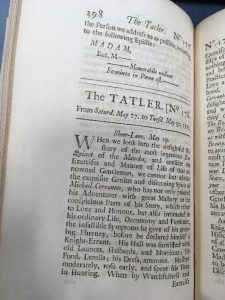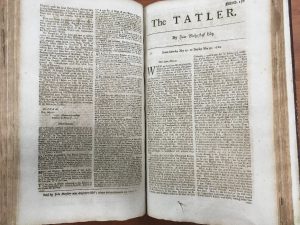Isabel Bielat ’20 and Professor Robert DeMaria
The Tatler, an influential British journal of periodical essays, circulated between 1709 and 1711. Richard Steele founded the journal with influence from satirist Jonathan Swift. With Joseph Addison and other London intellectuals, Steele produced content that included social commentary, literary criticism, and news. Much like modern media, The Tatler wrote for a society that mingled social, intellectual, political, and entertainment concerns.
This summer, under the guidance of Professor Robert DeMaria Jr., I worked on a critical edition of The Tatler, for publication by Cambridge University Press in 2020. This work will conform to editorial standards of copy-text accuracy, and draw from scholarly sources and digital resources to provide commentary that is relevant and useful to 21st-century readers.
While establishing the text of The Tatler, I immersed myself in the language of the era. An important stage of the editorial process was collating the three early printed editions held in Special Collections and annotating their differences, giving preference to the octavo as copy-text. Textual inconsistencies provided insights into authorship, emerging spelling and grammatical conventions, and the journey of the text from contributor to printer. The collation process, begun by previous Ford Scholars, accumulated enough text to begin the historical and literary footnotes.
In addition to experiencing the linguistic conventions of the time, I found it essential to appreciate the historical context of the essays, and to communicate it through footnotes. The Tatler’s connection to historical events was most obvious in its news reports, such as those related to the War of the Spanish Succession. We consulted concurrent reports in the London Gazette, which Steele had edited from 1707 to 1710, and clarified them using scholarly sources. Where The Tatler referred to historical figures by unclear or contested titles, we identified them unambiguously. Other aspects of the text were enhanced by an understanding of the roles played by specific writers, politicians, theatres, and coffeehouses. Annotating such allusions situated the essays in the social and political spheres of 18th-century London, a London that was observing the world as eagerly as it observed itself.
The advertisements that followed each issue of the Tatler interacted with the preceding text in a metatextually innovative way, and provided local economic and historical insights. For the critical edition, we developed protocols to summarize and contextualize advertisements, as through including Short Title Catalog numbers corresponding to the appropriate editions of advertised books.
While preparing footnotes on unusual vocabulary, we found that The Tatler is considered not merely a representational, but a founding text by sources such as Samuel Johnson’s dictionary and the OED. Additionally, The Tatler is rife with references to other works across a variety of genres and eras. From appending modern translations to the Latin and Greek epigraphs to citing literary quotations, editing The Tatler opened a window into its literary world. We hope the critical edition opens windows into The Tatler’s historical and literary world for readers as well.
I sincerely appreciate this opportunity the Ford Scholars program offered me to participate in The Tatler project. I learned from editing the historic text, researching to enhance the text, and preparing books for publication. As I enter my junior year at Vassar, I am looking forward to continuing this project and preparing for future academic research, especially projects that preserve literary and historical resources in ways that make them accessible to other researchers and students.

Tatler 178 in the octavo edition. Image courtesy of Vassar College Archives & Special Collections Library.

Tatler 178 in the folio printing, preceded by the advertisements from Tatler 177. Image courtesy of Vassar College Archives & Special Collections Library.
